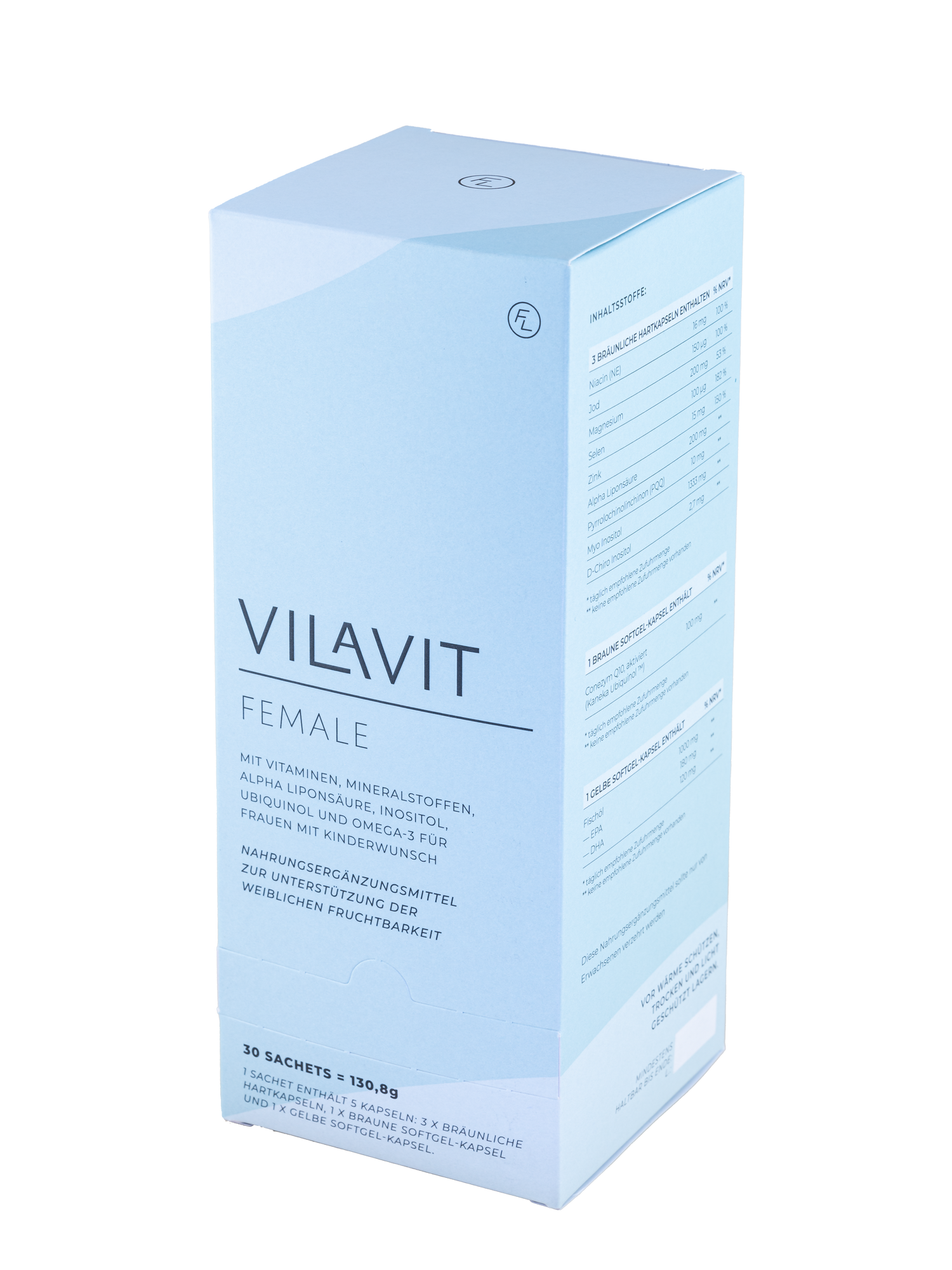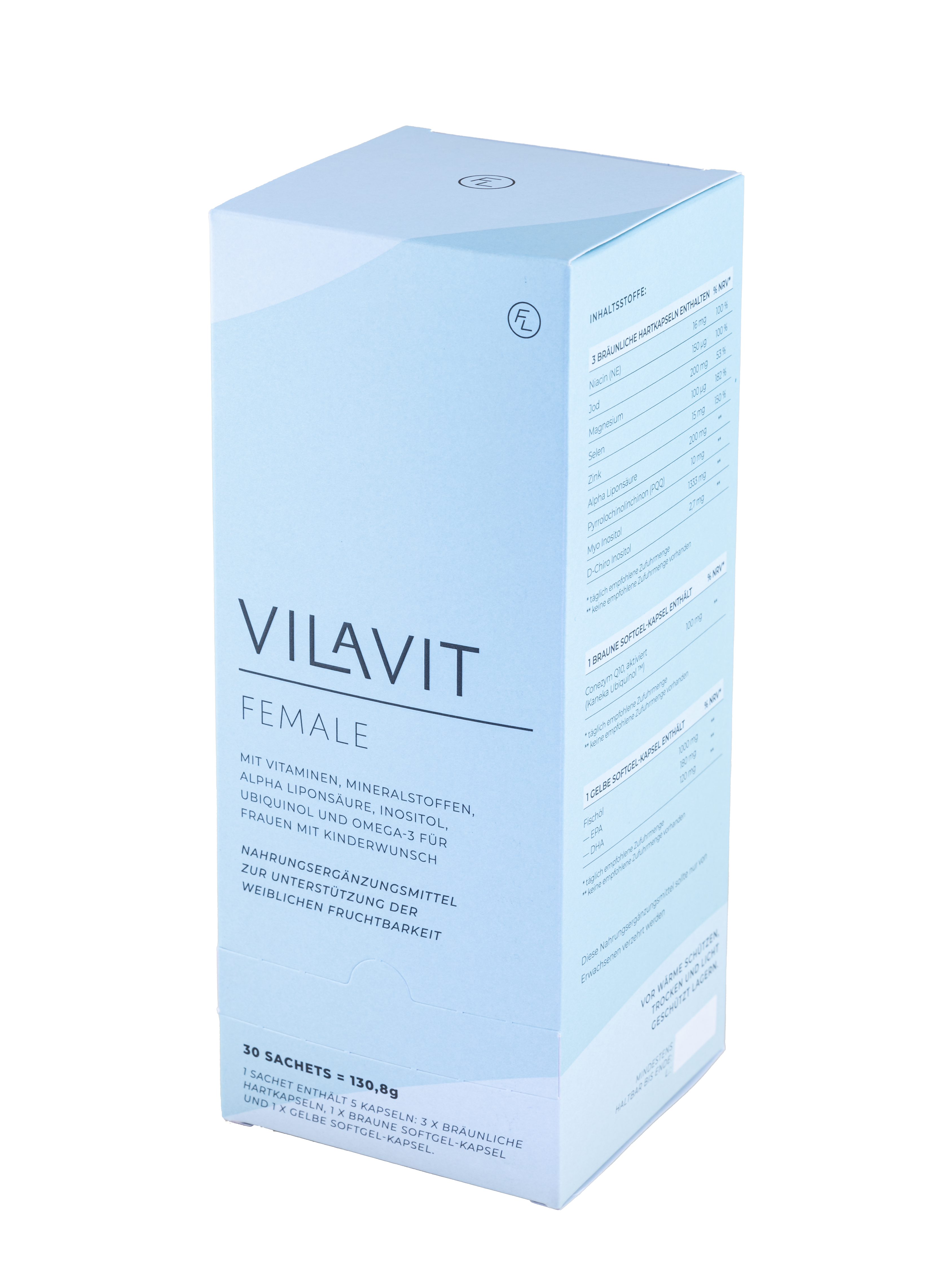Polycystic Ovary Syndrome (PCO or PCOS) is a common hormonal disorder that can significantly impact fertility, making it more difficult to conceive and fulfill the desire to have children.
Despite the challenges posed by PCOS, there are now numerous evidence-based approaches that can help reduce the impact of PCOS on fertility and improve the chances of pregnancy.
Learn all about the causes and diagnosis of PCOS as well as proven therapeutic approaches. We also provide valuable tips on how to improve your chances of getting pregnant.
What is Polycystic Ovary Syndrome (PCOS)?
Polycystic Ovary Syndrome (PCOS) is a complex metabolic disorder (endocrine condition) characterized by numerous symptoms. It is considered one of the most common hormonal disorders in women, affecting about 5-10% of all women of childbearing age.
In PCOS, the body produces excess androgens. This leads to inadequate regulation of the menstrual cycle. The follicles in the ovaries do not mature properly and do not release eggs. The lack of maturation and release of eggs affects fertility in women with PCOS.
One aspect of PCOS may be the presence of polycystic ovaries, meaning that many small, fluid-filled sacs form in the ovaries and are visible on ultrasound. However, PCOS is a complex hormonal disorder that goes beyond these cysts.
Diagnosis of PCOS
The diagnosis of Polycystic Ovary Syndrome (PCOS) is made through a combination of blood tests for hormone levels, ultrasound examinations, and medical consultations regarding the presence of certain symptoms.
The main steps in diagnosing PCOS are:
- Blood Tests
A blood test helps check hormone levels. Key hormones include:
- Androgens: Elevated levels of male hormones (hyperandrogenemia) like testosterone and dihydrotestosterone (DHT) can be an indicator of PCOS.
- Testosterone: >70 ng/dl is elevated, >100 ng/dl is significantly elevated
- Dihydrotestosterone (DHT): >150 ng/dl
- Luteinizing Hormone (LH) and Follicle-Stimulating Hormone (FSH): A common pattern in PCOS is an increased ratio of LH to FSH. While LH is often elevated, FSH levels may be normal or low. An LH to FSH ratio of 2:1 or higher can indicate a hormonal imbalance.
- Insulin: Many women with PCOS have insulin resistance, so insulin levels may also be elevated.
- SHBG (Sex Hormone-Binding Globulin): SHBG levels are often low in PCOS. SHBG binds testosterone and other androgens, and lower levels can lead to higher free androgen levels in the blood.
- Transvaginal Ultrasound
An ultrasound of the ovaries is performed to check for the presence of numerous small cysts in the ovaries. This is a characteristic, but not solely sufficient, feature for diagnosing PCOS.
- Medical History
A discussion with a specialist about symptoms such as:
- Menstrual irregularities: Rare menstruation (oligomenorrhea) or absence of menstruation (amenorrhea)
- Excessive hair growth (hirsutism)
- Acne
- Hair loss
- Medical/family predisposition
PCOS is typically diagnosed when the patient meets at least two of the following three criteria: irregular menstrual cycles, elevated androgen levels, and the presence of polycystic ovaries on ultrasound.
Cause of PCOS
The exact cause of Polycystic Ovary Syndrome (PCOS) is not fully understood. It is believed to involve a combination of genetic, hormonal, and environmental factors.
One possible trigger for PCOS could be a malfunction of an enzyme that normally regulates the production of male hormones. This malfunction leads to increased levels of androgens (male hormones) in the body. Such an increase can contribute to the typical symptoms of PCOS, such as irregular menstrual cycles and excessive hair growth.
Symptoms of PCOS
Women with Polycystic Ovary Syndrome (PCOS) may experience a variety of symptoms. The most common include:
- Irregular Menstrual Cycles: Very long and irregular menstrual cycles or missed periods are a common symptom.
- Ovulation Disorders: Failure of regular egg maturation and release can lead to fertility problems.
- Increased Androgen Levels: This can manifest as acne, excessive hair growth (hirsutism), hair loss on the scalp, or oily skin.
- Polycystic Ovaries: Numerous small cysts in the ovaries may be visible on ultrasound.
- Weight Gain: Women with PCOS often struggle with weight control or are more prone to weight gain.
- Insulin Resistance: PCOS may be associated with insulin resistance, which can lead to elevated blood sugar levels and increase the risk of developing type 2 diabetes.
The severity of these symptoms can vary, and not all women with PCOS experience all these complaints.
Treatment Options for PCOS for Women Seeking Pregnancy
For women with PCOS who are having difficulty conceiving, several treatment options are available. These aim to regulate hormonal balance:
- Menstrual Cycle Regulation & Ovulation Induction
- Clomiphene: Stimulates the ovaries to produce eggs and is commonly used to induce ovulation and improve fertility. (Elkhateeb RR et al, 2017)
- Metformin: A medication primarily used to treat type 2 diabetes but can also improve insulin sensitivity and help regulate the menstrual cycle in women with PCOS. (Attia GM et al, 2023) However, it is crucial to note that Metformin does not replace the need for lifestyle changes in overweight and obese women with PCOS. (Lashen H et al, 2018)
- Gonadotropins (LH, FSH, and combinations of LH and FSH): Hormones generally used to stimulate ovulation in women with PCOS, especially if other treatments like clomiphene citrate are unsuccessful.
- Myo-Inositol: Improves insulin sensitivity and supports normal ovarian function, which can contribute to regulating the menstrual cycle. (Unfer V et al, 2017)
- In-vitro Fertilization (IVF): If other treatments are unsuccessful, IVF can be used to retrieve eggs, fertilize them outside the body, and then implant them into the uterus.
- Laparoscopic Ovarian Drilling: A surgical method where small holes are made in the ovaries to reduce androgen production and promote ovulation.
Tips for Women with PCOS to Improve Fertility
For women with Polycystic Ovary Syndrome (PCOS), the path to pregnancy can be challenging, but there are several effective strategies to improve fertility and increase the chances of successful conception. Here are some comprehensive tips to help mitigate the effects of PCOS on fertility:
-
Active Lifestyle Ensure that you are physically active for at least 150 minutes a week, whether through brisk walking, cycling, or swimming. Regular exercise helps improve insulin resistance and can help stabilize your menstrual cycle.
-
Healthy Diet Focus on a diet rich in fiber, healthy fats, and lean proteins. Avoid heavily processed foods and sugar, as these can cause insulin spikes. Opt for whole grains, fresh fruits, vegetables, nuts, and seeds. This diet supports not only your hormonal balance but also promotes healthy ovarian function.
-
Micronutrients Utilize high-quality micronutrients to support healthy ovarian function with regular menstrual cycles, promote ovulation, and improve egg quality.
-
Medical Support Seek medical advice from a specialist to receive a personalized treatment plan that can specifically enhance your fertility.
Use these tips as a foundation to achieve your desire for children. By combining lifestyle changes, targeted micronutrients, and informed medical treatment, you can significantly improve your chances of successful conception. You can do it—stay persistent and be patient with yourself!
Frequently Asked Questions (FAQs)
What are the chances of getting pregnant with PCOS?
The chances of getting pregnant with Polycystic Ovary Syndrome (PCOS) vary significantly and depend on several factors, including the severity of PCOS and individual symptoms.
Women with PCOS without treatment have about a 20-30% chance of pregnancy within a year. The chances are lower compared to women without PCOS. Women with PCOS who receive medical treatment have significantly better chances. For example, the pregnancy rate for women treated with clomiphene or metformin is about 30-40% per cycle.
How long does it usually take for a woman with PCOS to get pregnant?
The time to conceive can vary. With appropriate treatment, many women can become pregnant within 12 months, but it depends on individual factors.
Do you have to be overweight to be diagnosed with PCOS?
No, you do not have to be overweight to be diagnosed with Polycystic Ovary Syndrome (PCOS). PCOS can occur in women of all weight classes. While overweight and obesity are common associated conditions, especially due to insulin resistance, this is not the only way the syndrome can manifest.
References
- Elkhateeb RR, Mahran AE, Kamel HH. Long-term use of clomiphene citrate in induction of ovulation in PCO patients with clomiphene citrate resistance. J Gynecol Obstet Hum Reprod. 2017
- Attia GM, Almouteri MM, Alnakhli FT. Role of Metformin in Polycystic Ovary Syndrome (PCOS)-Related Infertility. 2023
- Lashen H. Role of metformin in the management of polycystic ovary syndrome. Ther Adv Endocrinol Metab. 2010
- Unfer V, Facchinetti F, Orrù B, Giordani B, Nestler J. Myo-inositol effects in women with PCOS: a meta-analysis of randomized controlled trials. Endocr Connect. 2017
















